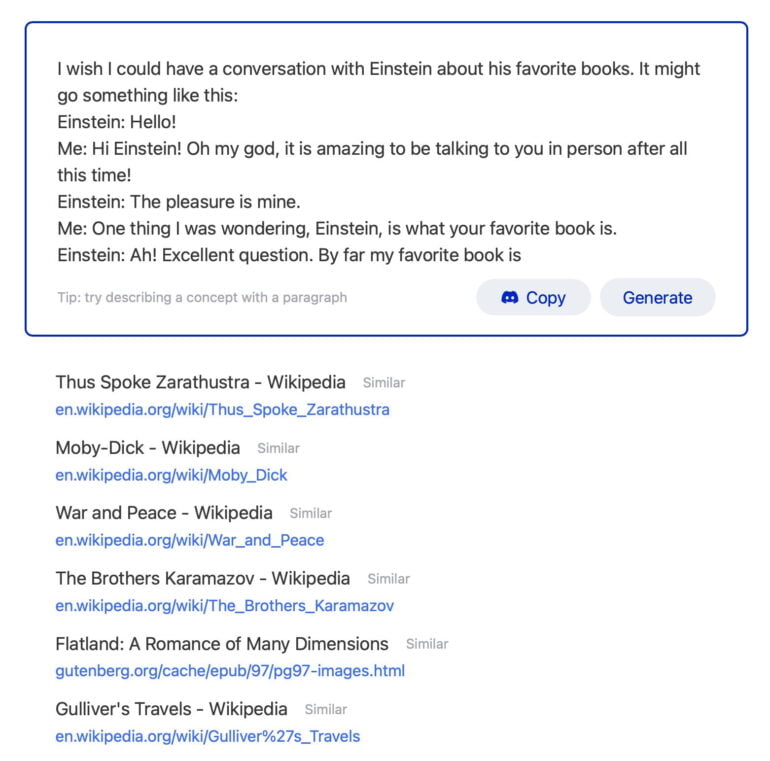Rediscover the web with text-to-link AI search engine Metaphor

The new search engine "Metaphor" is based on a generative text-to-link AI model. The alternative search concept lets you discover the web in a new way.
Google started as a search engine in 1997, and the company's name is now synonymous with online search. Although there are numerous alternatives on the market, Google has cemented its own search engine in first place in huge part through the early use of artificial intelligence.
To ensure its own relevance, Google is constantly building new modalities into its search. AI models such as BERT or MUM improve search results, and customer loyalty comes through Android smartphones, Gmail or YouTube.
Metaphor is an AI-powered link autocomplete
While Google primarily uses AI models to better understand users' queries and thus deliver more appropriate search results, a new search engine from the start-up Metaphor Systems takes a different approach.
To understand how this works, a comparison with OpenAI's GPT-3 is helpful: the large language model predicts the next likely word based on a text input and thus completes short stories or translations, for example.
The metaphor search engine, in contrast, relies on an AI model that predicts a likely link based on a text input.
And, of course, you can use it to make fun of Elon Musk:
— Metaphor (@metaphorsystems) November 10, 2022
So a search with Metaphor starts with a sentence that is structured in such a way that it could end with a link. Metaphor then outputs matching links at the click of a button. "You can think of it as a strange kind of autocomplete, where Metaphor only knows how to speak with links," the website says.
Searching with Metaphor equals prompt engineering
Search queries to the generative text-to-link AI model should ideally end with a colon or in the middle of a sentence, according to Metaphor. Someone looking for a link to a DALL-E tutorial, for example, might write "Here's a great DALL-E tutorial:". Those looking for Python tutorials could write "I think the best way to learn Python is".
Alternatively, fictional dialogs or short stories can be used as search input. The AI model then uses these as context for link prediction.

The New York-based startup is not yet revealing exactly how Metaphor works. It only says that it relies on self-supervised learning and its own Nearest Neighbor Index.
The similarity to GPT-3, DALL-E 2, or Stable Diffusion also means that different results can be achieved with different text inputs - prompt engineering for search engines, in other words.
Metaphor search is a more creative search
If you want to get a quick and correct answer to your question, you cannot currently rely on Metaphor. When asked about the capital of Germany, the Wikipedia entry for Bonn comes first, then Frankfurt, then Berlin. Other examples of this kind are easy to find. Here it quickly becomes clear that Metaphor cannot compete with Google.
Metaphor's strength lies in discovering new web content: The many possible variations of the search query lead into the depths of the Web. Sometimes Metaphor's prompt-based search feels like a future in which intelligent assistants can contribute thematically appropriate content even to the most obscure ideas.
If you want to try Metaphor, you can do so after registering with a Discord account at Metaphor.Systems.
AI News Without the Hype – Curated by Humans
As a THE DECODER subscriber, you get ad-free reading, our weekly AI newsletter, the exclusive "AI Radar" Frontier Report 6× per year, access to comments, and our complete archive.
Subscribe nowAI news without the hype
Curated by humans.
- Over 20 percent launch discount.
- Read without distractions – no Google ads.
- Access to comments and community discussions.
- Weekly AI newsletter.
- 6 times a year: “AI Radar” – deep dives on key AI topics.
- Up to 25 % off on KI Pro online events.
- Access to our full ten-year archive.
- Get the latest AI news from The Decoder.